As we are just hours away from what may be the last encounter of the greatest rivalry in tennis, that is Nadal vs Federer at the Australian Open final, I’m still marvelled at Rafa’s friday’s semifinal performance, where once again he wrote another page in the book of tennis history. I’ll probably won’t write a follow up entry after the result of the finals, because at this point, it simply doesn’t matter.
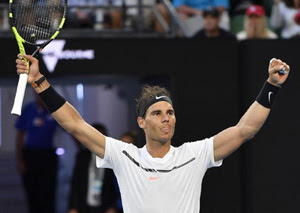
Rafa had already made a statement on his third round match when he faced up and coming, rising star 19-year old Alexander Zverev, beating him in five close sets 4-6/6-3/6-7/6-3/6-2. Zverev played as great as anyone could, and there is no doubt in my mind that had he won that match, it would have been him playing Dimitrov in the semifinals.
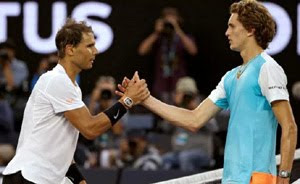
Nadal shakes hand with rising star Zverev.
But Nadal simply refused to pass the torch to the new guard, instead out-playing and out-lasting Zverev with a combination of shots, strategy, fitness and experience, and in the end he sent a clear message to everyone on the tour: He’s still around and he’s still hungry.
Against Dimitrov -known as Baby Federer for his similar game to Roger’s-, the story was a bit different. Dimitrov had a remarkable second half of 2016 after hiring a new coach, who worked on the mental aspect of the game, which is known to be Grigor’s weakness. Success included his first victory against Nadal, after seven losses. So when both men met at Rod Laver’s arena on Friday, there was a considerable amount of fans who thought that this time Dimitrov would beat Nadal, especially when you come to think that Nadal’s recovery may have impacted his endurance and stamina, probably folding against Grigor’s overwhelming forehand and dazzling backhand. While Nadal is known to exploit one-handed backhand with his heavy top spin, tennis experts agreed that Dimitrov’s backhand would not be threatned by this, due to Grigor being taller and more athletic than other players, hence more able to handle Nadal’s top spin. Zverev was a good test, but Dimitrov was going to be the real deal.
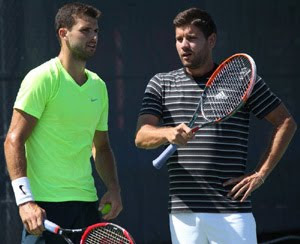
Dimitrov’s new coach Daniel Vallverdu
has become a significant positive addition
This proved true as the match progressed, and as the scoreboard read 6-3/5-7/7-6/6-7/3-4, things were starting to look gray for Nadal’s future. Then, they turned dark, when at the eigth game, Nadal was serving 15-40, which meant that if Dimitrov broke, he would be serving for the match.
Then, all of a sudden, something happened: something inside Nadal, “clicked”.
Playing the best tennis of the match, Rafa saved both breakpoints, sent the game in advantage to his favor, and won the game to tie the score at 4-4. Dimitrov’s skin went pale, his eyes looked lost and his body language began to tell the story of a man that would soon lose the match. Nadal on the other hand, looked as if he was ready to lift the trophy. So what exactly happened in that 15-40, the point where the sealing of Nadal’s victory started?
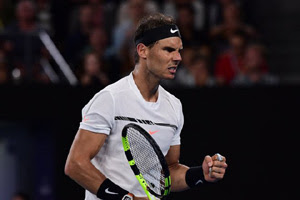
There are moments in life when suddenly everything you have heard, learned, known, dreamed, believed, and you have the ability to do, just happens. To one degree or another, and to a certain extent, there is a special moment when you realize that you are able to achieve great things in life. Those moments are huge, monumental confidence boosters, because they are the ones that take you from being good at something and turn you into being great at something. Some of them come in the form of an awakening call at a very low point in the career of the involved person.
Most people around the world probably don’t even know who Steve Kerr is, and that’s nothing to be ashamed of, because he’s not exactly a great NBA player with a legendary status such as Jordan, Magic, Bird, Thomas, and so on.
However in 1997, Steve went from being a good player, to a great player. Earlier in the season, he had been punched on the face by Michael Jordan during a heated practice session for missing a few shots. Kerr was new in Chicago and he was brought as an alternative great shooter, to support Jordan, Pippen and Kukoc. However during the first games, Kerr’s supposed great skills at shooting didn’t show up. He lacked concentration, passion and that special edge that was needed in such a competitive team as Chicago. Jordan probably got fed up with it, and it all blew during a practice game.
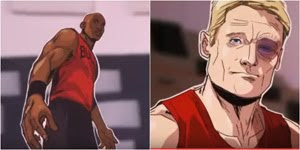
The incident went unnoticed back then and only today it has gained popularity thanks to both Jordan and Kerr openly talking about it. Kerr states that being punched by Jordan was an awakening moment. He realized that Jordan didn’t punch him because he was bad at shooting or because he had missed shots in practice. He punched him because he wanted Steve to raise his competitiveness, to raise his skills, and to raise his game so that while he definitely would never be legendary material, at least he would be teammate enough to work next to Michael Jordan, so that in a moment of crucial need, Michael -as the leader of the team- could count on him. That moment came in game six of the 1997 finals.
With 28 seconds left in the game, the score was tied at 86 between Chicago Bulls and the Utah Jazz. A timeout had been called by the Bulls, and most of the world watching the game believed and expected that Jordan would be the one taking what would probably be the final shot to win it for Chicago. The Jazz probably expected that too. Jordan -being the wise and intelligent player he was- also expected it, so he came up with a solution: since the Jazz would likely double-team him, he would need someone to pass the ball to, so that that person could take the shot. That person had to be a great shooter, and that person was Steve Kerr. Jordan told Kerr what would happen (the Jazz double-teaming on him) and he told Kerr to “be ready”. Kerr’s reply -now immortalized on youtube- was: “I’ll be ready”.
From that day and on, Kerr became known as a great shooter and master of the 3-point shot. Eventually, the moment would bring a larger and broader impact on Steve’s career as a player and as a coach.
It would be pointless to say that Nadal’s achievements depended on that 15-40 3-4 game against Dimitrov. However I will go as far as saying that the remaining of Nadal’s career from that night and on, depended on that whether he won point or got his serve broken and faced Dimitrov serving for the match.
In a few hours, Nadal will face Federer for the 35th time in their careers, for the 2017 Australian Open Grand Slam title. I believe Nadal will beat Federer and claim his 15th Grand Slam, all because of him winning that 15-40 3-4 on Friday night.
EDIT: In an amazing breathtaking performance, Roger won. I really thought Rafa would win; then again, on Dec 30th Roger tweeted this:

Talk about the moment when it all clicks.
Thanks Roger and Rafa, for teaching us what true motivation is.
HR

